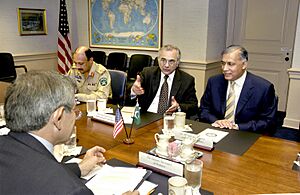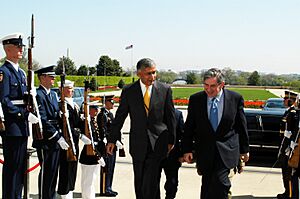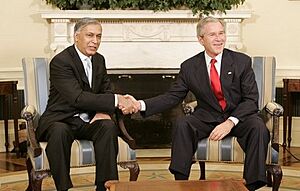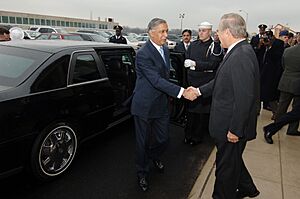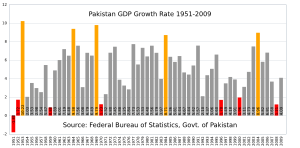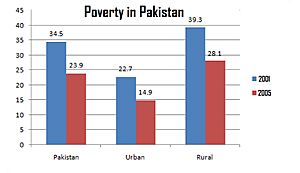Shaukat Aziz facts for kids
Quick facts for kids
Shaukat Aziz
|
|
|---|---|
|
شوکت عزیز
|
|
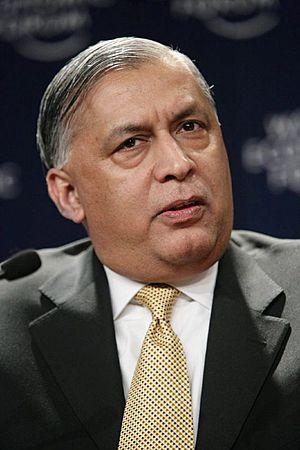
Aziz in 2007
|
|
| 15th Prime Minister of Pakistan | |
| In office 28 August 2004 – 15 November 2007 |
|
| President | Pervez Musharraf |
| Preceded by | Chaudhry Shujaat Hussain |
| Succeeded by | Muhammad Mian Soomro (caretaker) |
| Minister of Finance | |
| In office 6 November 1999 – 15 November 2007 |
|
| Prime Minister | Zafarullah Khan Jamali Chaudhry Shujaat Hussain Himself |
| Preceded by | Ishaq Dar |
| Succeeded by | Salman Shah (caretaker) |
| Member of the National Assembly of Pakistan | |
| In office 20 August 2004 – 15 November 2007 |
|
| Preceded by | Eman Waseem |
| Succeeded by | Sardar Saleem Haider Khan |
| Constituency | NA-59 (Attock-III) |
| Personal details | |
| Born |
Shaukat Abdul Aziz
6 March 1949 Karachi, Federal Capital Territory, Pakistan |
| Other political affiliations |
PML(Q) (2002–2007) |
| Spouse | Rukhsana Aziz |
| Residences | London, United Kingdom |
| Alma mater | Gordon College IBA |
Shaukat Aziz (born 6 March 1949) is a Pakistani-born British former banker. He served as the 15th prime minister of Pakistan from August 28, 2004, to November 15, 2007. Before becoming prime minister, he was the finance minister of Pakistan from November 6, 1999, to August 27, 2004. After his time as prime minister, he moved to the United Kingdom.
Aziz was born in Karachi, Pakistan. He studied at the Institute of Business Administration, Karachi and started working at Citibank Pakistan in 1969. He became an executive vice-president at Citibank in 1999. In 1999, he entered politics at the request of Pervez Musharraf and became Pakistan's finance minister. In 2004, Musharraf nominated him to be prime minister.
Contents
Early Life and Education
Shaukat Aziz was born in Karachi, Pakistan, on March 6, 1949. He went to school in Karachi and Abbottabad. His father, S.A. Aziz, was a radio engineer for the Pakistan Broadcasting Corporation.
His family moved to Abbottabad, where he attended Abbottabad Public School. Later, they moved back to Karachi. Aziz finished high school at Saint Patrick's High School, Karachi. He then went to Gordon College (Rawalpindi) in Rawalpindi, Punjab province, in 1965. He earned a degree in Economics in 1967. In 1969, he completed his MBA in business administration from the Institute of Business Administration, Karachi (IBA).
Banking Career
Shaukat Aziz began his career at Citibank Pakistan in 1969 as a credit officer. He worked in many countries, including Pakistan, Greece, the United States, the United Kingdom, and Singapore. In the United States, he worked at Citibank's office in the Empire State Building in New York City.
Aziz held several important roles at Citibank, including managing director of Citibank Singapore. He helped expand Citibank's operations in many countries. He also played a key role in bringing international banking to Pakistan in the 1990s. He managed funds for Citibank and other financial companies in global markets. Aziz believed his banking career helped him prepare for his public service roles.
Aziz often visited Pakistan to help expand Citibank's services. In the 1990s, he worked with the governments of Benazir Bhutto and Nawaz Sharif. He helped negotiate economic aid packages for Pakistan. He also built connections with the United States government and financial institutions like the World Bank.
Finance Minister
Before returning to Pakistan in 1999, Shaukat Aziz was president of Citi Private Bank in New York. After Pervez Musharraf took power in October 1999, Aziz returned to Pakistan. He became the Finance Minister in November 1999.
As Finance Minister, Aziz was in charge of several important government divisions, including Finance, Economic Affairs, and Planning. He also led committees on investment and privatization. His goal was to improve Pakistan's economy. He worked to attract foreign investment by offering incentives and improving economic policies.
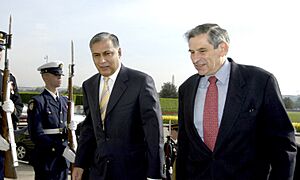
After the September 11 attacks in the United States, Pakistan played a role in the War on Terror. Aziz traveled to the United States to discuss financial aid and debt relief for Pakistan. He worked with the U.S. Treasury to develop economic reforms, including better budget control. These plans were well-received by the United States.
In 2001, Aziz restarted the Privatization Programme. This program aimed to open state-owned businesses to private companies. This led to rapid economic growth and industrial development in Pakistan. After the 2002 elections, Aziz continued his economic policies. His policies helped people afford homes and vehicles. Pakistan's economic performance was praised by the IMF and the World Bank.
Surviving an Attack
On July 30, 2004, while campaigning in the Attock District, Aziz survived an attack. The attack happened in Fateh Jang as he was leaving a meeting. A device exploded near his car, killing his driver and six other people. Aziz called the event "tragic" and said it strengthened his resolve to serve Pakistan.
Becoming Prime Minister
By 2004, Shaukat Aziz had become a close advisor to General Musharraf. After Mir Zafarullah Khan Jamali resigned as prime minister in June 2004, Chaudhry Shujaat Hussain nominated Aziz for the position. Musharraf also supported Aziz.
At the time, Aziz was a Senator, not a member of the National Assembly. The constitution required the prime minister to be a member of the National Assembly. Aziz was seen as a "technocrat" (an expert in a technical field) and had gained trust from the government and the public. He was seen as similar to Dr. Manmohan Singh, who had become prime minister of India.
Aziz was known for being well-dressed and focused on managing the government's daily operations. He worked to ensure policies were carried out effectively. To become prime minister, Aziz needed to win a seat in the lower house of parliament. He ran in two areas, Tharparkar District and Attock District, and won both. He chose to represent Attock.
Domestic Reforms
As prime minister, Aziz oversaw the development of the local government system. This program aimed to make local governments more transparent and accountable. His government also installed many water supply and sanitation filter plants through the Khushal Pakistan program.
Aziz took a firm stance against political opponents. He supported holding non-partisan local government elections across the country, starting in Karachi in 2005. His government also worked to improve law and order, especially in Balochistan, and oversaw the first phase of the Gwadar port project.
One major event during his time was the situation at Lal Masjid in Islamabad. Aziz stated that his government tried to resolve the issue through talks to save lives.
Energy Policy
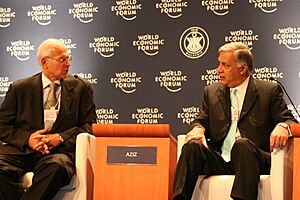
Aziz announced a "New 25-year energy plan" to increase Pakistan's use of imported oil for power. His government also promoted solar energy and wind power. He approved the construction of the CHASNUPP-II reactor with Chinese help. This 325 MW nuclear power plant was a significant step for nuclear technology in Pakistan.
In 2007, Aziz approved the development of KANUPP-II and the Nuclear Power Fuel Complex. He also worked to increase the capacity of the Pakistan Nuclear Regulatory Authority to ensure nuclear safety. He supported financing nuclear power projects and began initial construction for major hydroelectric power plants like the Diamer-Bhasha Dam.
Defence Policy
Aziz oversaw the development of the JF-17 Thunder fighter jet, built with China's help. He stated that Pakistan's defense policy was based on having enough deterrence to maintain peace. He also oversaw the transfer of technology for the first combat frigate, the F-22P Zulfiquar.
In 2006, Aziz visited China to seek cooperation in space technology. China agreed to help Pakistan develop and launch satellites. Aziz authorized the development of the Paksat-IR satellite. He also oversaw the expansion and modernization of Pakistan's nuclear deterrence program. In April 2006, he witnessed the first flight of the Shaheen-II missile. He emphasized that Pakistan would continue to pursue its security and energy needs, including nuclear technology.
Foreign Relations
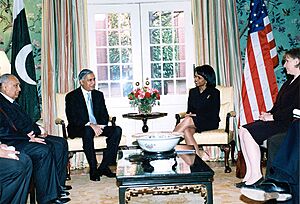
Aziz worked closely with Musharraf to strengthen Pakistan's relationships with other countries. He focused on improving ties with the United States, European Union, Russia, India, China, and Saudi Arabia. During his time, relations with the United States were very friendly.
In 2006, Aziz traveled to Iran with Recep Tayyip Erdoğan of Turkey. He urged the Iranian President to change course on its nuclear program. Aziz's time as prime minister also saw improvements in relations with Japan. He welcomed Japanese investment in manufacturing.
He also visited South Korea to strengthen relations. Aziz supported South Korea's position while being careful not to criticize North Korea. He signed agreements to improve trade and cultural ties between South Korea and Pakistan. Aziz strongly supported the United States in the fight against terrorism. He believed Pakistan could work with other nations for peace and stability.
After becoming prime minister in 2004, Aziz's first foreign visit was to China. In 2007, he made his final state visit to China to sign a Free Trade Agreement. He called China a "strategic partner" and a "time-tested friend." Aziz also worked to build closer economic ties with India and reduce conflicts.
He also worked to improve relations with Russia. In 2006, he stressed the need for cooperation between Pakistan and Russia in education, science, technology, energy, defense, and trade. In 2007, Russian Prime Minister Mikhail Fradkov visited Pakistan, the first Russian leader to do so in 38 years. They pledged to boost economic ties and signed cooperation agreements.
Economic Policy
During his time as finance minister and prime minister, Aziz strongly promoted privatization, deregulation, and economic liberalization. He opened large industries, petroleum companies, and state-owned corporations to private businesses. Under his leadership, agricultural production and construction increased. He also worked to liberalize trade by reducing tariffs.
Pakistan's GDP growth, which was 3.9% in October 1999, rose to between 6.6% and 9%. He successfully privatized many state-owned corporations. However, his policies faced challenges, especially with the Great Recession and electricity shortages that came later.
Some experts argue that his policies did not do enough to help the poor. Aziz defended his policies, saying they made institutions stronger that were close to failing.
After Being Prime Minister
Shaukat Aziz now lives in West London, United Kingdom. He serves on the boards of several companies. He has maintained good relationships with many members of his former government.
In 2012, surveys showed his popularity rating around 20.5%. Aziz remains active in discussing economic issues. He has criticized the International Monetary Fund (IMF) for its role during the 2008 financial crisis.
Financial Information
In 2017, Shaukat Aziz was mentioned in the Paradise Papers leaks. These leaks suggested he was connected to a trust he had set up. Aziz stated that he created this trust for estate planning purposes and that the funds came from his work at Citibank.
See also
 In Spanish: Shaukat Aziz para niños
In Spanish: Shaukat Aziz para niños
- List of prime ministers of Pakistan
- Privatization in Pakistan
- Market corporatisation
 | May Edward Chinn |
 | Rebecca Cole |
 | Alexa Canady |
 | Dorothy Lavinia Brown |


